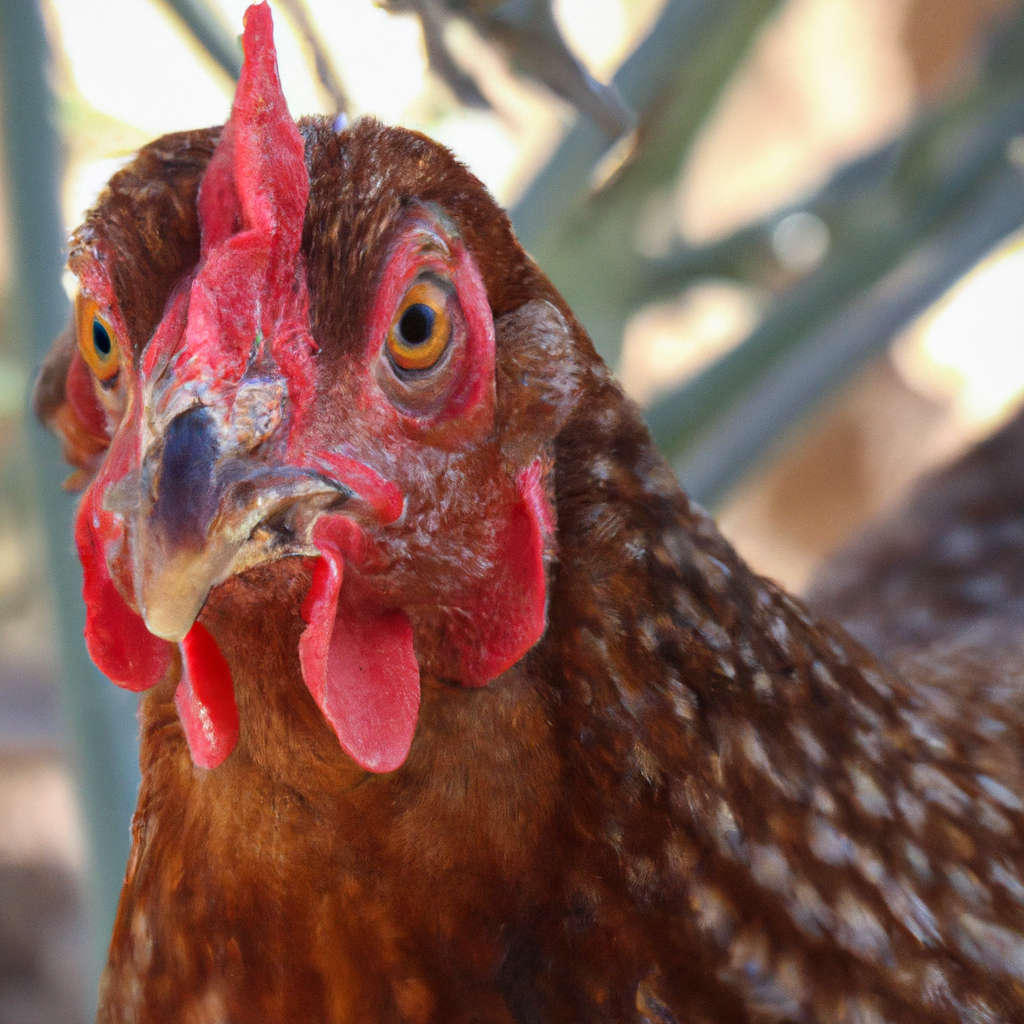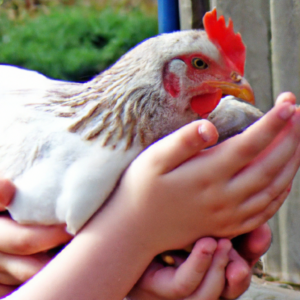
In this article, we will explore the signs that indicate a stressed or sick chicken, and provide you with practical solutions to help keep your feathered friends healthy and happy. Whether you are an experienced chicken owner or new to the world of poultry, it’s important to be able to recognize when your chickens are feeling under the weather. By understanding these signs and knowing what steps to take, you can ensure the well-being of your flock and provide them with the care they need. So, let’s dive into the world of chicken health and discover how to keep our beloved feathered companions in top shape.

Behavioral Signs of Stress or Illness
Chickens, like any living creatures, can experience stress or illness at times. It is important for chicken owners to be aware of the behavioral signs that may indicate such issues. By paying attention to these signs, you can provide timely care and support for your feathered friends.
Decreased Appetite
One of the first things you may notice is a decrease in your chicken’s appetite. If you observe that your chicken is not eating as much as usual or refusing to eat altogether, it could be a sign of stress or illness. It is essential to monitor their eating habits closely as a decrease in appetite can lead to malnutrition and further health complications.
Social Isolation
Another behavioral sign to watch out for is social isolation. Chickens are social animals that generally enjoy the company of their flock. If you notice a chicken suddenly becoming secluded or not participating in social activities, it may indicate that something is wrong. Social isolation can be a response to stress, illness, or injury, and it is important to investigate the underlying cause.
Listlessness
Listlessness or a lack of energy can be another indicative sign of a stressed or sick chicken. If you notice your chicken appearing unusually lethargic or inactive, it is crucial to pay attention to any additional symptoms and address the issue promptly. Observing their behavior and energy levels can help determine if further action is required.
Lack of Vocalization
Chickens are known for their vocalizations, including clucking and crowing. However, if you notice a sudden decrease in vocalization or an unusually quiet chicken, it may be a sign of stress or illness. Paying attention to changes in their vocal patterns can provide valuable insight into their well-being and help you take appropriate action.
Aggression or Excessive Pecking
While chickens can occasionally display pecking behavior as part of their natural hierarchy, excessive pecking or aggression towards other chickens can indicate stress or illness. It is important to monitor their interactions carefully and intervene if necessary to prevent harm. Understanding the underlying causes of aggression can help address the issue at its root.
Abnormal Posture or Gait
If you notice that your chicken is displaying an abnormal posture or gait, such as hunching over or limping, it may be a sign of injury or illness. Any sudden change in the way a chicken moves should be investigated further. Observing their movements in relation to their usual behavior can help identify any issues that require attention.
Decreased Egg Production
A decrease in egg production can be an indication of stress or illness in chickens. If you notice a significant decline in the number of eggs your chicken is laying or if they stop laying altogether, it may be a cause for concern. Monitoring their egg-laying patterns can help you identify potential health issues and take appropriate measures.
Feather-Pulling or Excessive Preening
Chickens regularly preen themselves to keep their feathers clean and in good condition. However, if you observe your chicken excessively preening or pulling out their own feathers, it can be a sign of stress, illness, or even parasites. Investigating the reason behind this behavior can help determine the appropriate course of action to ensure their well-being.
Increased or Decreased Water Consumption
Changes in water consumption can be indicative of various health issues in chickens. An increase in water consumption may be a sign of dehydration or an underlying condition, while a decrease in water intake can indicate illness. Monitoring their drinking habits and making adjustments accordingly can aid in preventing further complications.
Physical Signs of Stress or Illness
In addition to behavioral changes, chickens may also exhibit physical signs of stress or illness. Being aware of these signs can help you identify any potential health issues and provide appropriate care.
Pale Combs and Wattles
The comb and wattles of a chicken are typically vibrant and colorful, indicating good health. However, if you notice a pale or discolored appearance in these areas, it may suggest anemia or poor circulation. Checking the color and condition of their combs and wattles regularly can provide insights into their overall health.
Discharge from Eyes, Nostrils, or Vent
Any discharge from the eyes, nostrils, or vent of a chicken can be a sign of infection or illness. The presence of mucus, pus, or blood should not be ignored and warrants further investigation. Regularly monitoring for any abnormal discharges can help identify potential respiratory or reproductive issues.
Swollen Joints or Lameness
Swollen joints or lameness in chickens can be indications of various diseases or injuries. If you observe that your chicken is having difficulty walking or shows signs of joint inflammation, it is important to assess the situation promptly. Identifying the cause of swollen joints or lameness can help determine the appropriate treatment and prevent further complications.
Dirty or Matted Feathers
Healthy chickens maintain clean and well-groomed feathers. If you notice feathers that appear dirty, matted, or unkempt, it may be a sign that your chicken is unwell. This could be due to a lack of energy or difficulty in preening themselves. Checking the condition of their feathers regularly can help you spot any issues and take appropriate action.
Weight Loss or Weight Gain
Monitoring your chicken’s weight is crucial for detecting potential health problems. Significant weight loss or weight gain can indicate various underlying issues, including metabolic disorders or nutritional deficiencies. Regularly weighing your chickens or keeping an eye on their body condition can help you identify abnormal fluctuations in weight.
Visible Parasites on Feathers or Skin
External parasites, such as lice or mites, can cause discomfort and distress in chickens. If you notice any visible pests on their feathers or skin, it is essential to address the problem promptly. Regularly inspecting their bodies for signs of parasites can help you maintain their well-being and prevent infestations.
Red or Inflamed Skin
Healthy chicken skin should be smooth and free from visible inflammation. If you observe redness, irritation, or swelling on their skin, it may indicate an underlying condition or injury. Monitoring the condition of their skin regularly can help you detect any abnormalities and provide necessary treatment.
Abnormal Feces or Diarrhea
Changes in the color, consistency, or frequency of a chicken’s feces can be indicative of gastrointestinal issues or infections. If you notice blood, mucus, or abnormal odors in their droppings, it is crucial to investigate the matter further. Monitoring their fecal output and ensuring consistency can help in identifying digestive problems.

Environmental Causes of Stress
Chickens are sensitive animals that can be significantly affected by their environment. Understanding and addressing potential stressors can help minimize the risk of illness and promote their overall well-being.
Poor Ventilation
Proper ventilation is crucial for maintaining a healthy environment for chickens. Inadequate airflow can lead to increased humidity, ammonia buildup, and the spread of pathogens. Ensuring good ventilation in the chicken coop is important for preventing respiratory problems and maintaining optimal air quality.
Overcrowding
Overcrowding can have detrimental effects on the health and behavior of chickens. When chickens are overcrowded, they may experience increased stress, limited access to resources, and a higher risk of disease transmission. Providing adequate space for each chicken is essential for their physical and mental well-being.
Extreme Temperatures
Chickens are susceptible to extreme temperatures, whether hot or cold. Exposure to excessive heat can lead to heat stress and dehydration, while extreme cold can cause frostbite or hypothermia. Providing appropriate temperature regulation and shelter is crucial for preventing temperature-related health issues.
Lack of Clean Water or Proper Nutrition
Access to clean water and a balanced diet is essential for maintaining a chicken’s health. Lack of clean water can lead to dehydration and potential illnesses. Similarly, a diet lacking in essential nutrients can result in nutritional deficiencies and overall compromised health. Regularly providing fresh water and a well-balanced diet is vital for their well-being.
Predator Threats or Excessive Noise
Chickens are prey animals, and constant exposure to potential predators or excessive noise can cause chronic stress. Threats from predators or loud noises can disrupt their natural behavior and induce anxiety. Ensuring a secure and quiet environment can help minimize stress levels and keep your chickens healthy.
Inadequate Lighting or Too Much Artificial Light
Proper lighting is important for regulating a chicken’s biological processes and maintaining a healthy circadian rhythm. Too little light can disrupt their reproductive cycles and overall well-being, while excessive artificial light can cause insomnia and related health problems. Providing appropriate natural and artificial lighting is important for their health and productivity.
Dirty or Unsanitary Living Conditions
Living in dirty and unsanitary conditions can lead to increased disease transmission and compromised immune systems in chickens. Accumulated feces, damp bedding, and poor hygiene practices can create an ideal environment for bacterial and fungal growth. Maintaining a clean and sanitary coop is essential for preventing illness and promoting overall chicken health.
Disease and Illnesses in Chickens
Despite your best efforts, chickens can still be susceptible to various diseases and illnesses. Being aware of the common ailments they may encounter can help you take appropriate action and provide necessary care.
Respiratory Illnesses
Respiratory illnesses, such as infectious bronchitis and Newcastle disease, are highly contagious and can spread rapidly among a flock. Symptoms include coughing, sneezing, difficulty breathing, and nasal discharge. Vaccination and proper biosecurity measures are key in preventing the spread of these diseases.
Parasitic Infections
Chickens can suffer from external parasites like lice, mites, and internal parasites like worms. Infestations can cause itching, feather loss, anemia, and poor overall health. Regularly inspecting your chickens for signs of infestation and implementing deworming programs can help keep them parasite-free.
Bacterial Infections
Bacterial infections, such as salmonella and E. coli, can cause severe health issues in chickens. These infections often manifest as diarrhea, decreased appetite, lethargy, and respiratory problems. Proper sanitation, good hygiene practices, and regular veterinary care are essential for managing bacterial infections.
Viral Infections
Viral infections, such as avian influenza and Marek’s disease, can have devastating consequences for a chicken flock. These infections may cause respiratory distress, neurological symptoms, decreased egg production, and high mortality rates. Vaccination, strict biosecurity protocols, and prompt veterinary intervention are crucial in preventing and managing viral infections.
Fungal Infections
Fungal infections, such as aspergillosis and candidiasis, can affect chickens’ respiratory systems and overall health. Moldy environments and contaminated feed can contribute to the growth of fungi. Maintaining proper ventilation, clean bedding, and providing a mold-free environment are important for preventing fungal infections.
Nutritional Deficiencies
Inadequate nutrition can lead to various deficiencies in chickens, affecting their overall health and productivity. Vitamin and mineral deficiencies can result in weak immune systems, poor feather condition, decreased egg production, and skeletal abnormalities. Offering a well-balanced and complete diet suited to their specific needs is essential for preventing nutritional deficiencies.
Reproductive Disorders
Chickens can experience reproductive disorders, such as egg binding or prolapse. Egg binding occurs when an egg gets stuck in the oviduct, while prolapse refers to the protrusion of the reproductive organs. These conditions can be life-threatening and require immediate veterinary attention.
Neurological Disorders
Neurological disorders, such as botulism and Marek’s disease, can affect a chicken’s nervous system and coordination. Symptoms may include paralysis, muscle weakness, tremors, and loss of balance. Vaccination against Marek’s disease and maintaining a clean environment are important preventive measures.

First Steps: Isolating and Observing the Chicken
When you suspect a chicken may be stressed or sick, it is important to take initial steps to assess the situation and provide appropriate care.
Separating the Sick or Stressed Chicken from the Flock
Isolating the affected chicken from the rest of the flock is crucial to prevent the potential spread of any infections or diseases. This also allows you to provide individualized care and monitor the chicken’s progress more closely.
Creating a Quiet and Comfortable Environment for Observation
A quiet and comfortable environment can help reduce stress for the sick or stressed chicken. Providing a separate space with appropriate bedding, access to food and water, and limited external disturbances can aid in their recovery.
Noting Any Obvious Physical Symptoms
Take the time to carefully observe the chicken and note any visible physical symptoms. Pay attention to changes in their behavior, posture, appetite, and any signs of distress or discomfort. Documenting these observations can provide valuable information to a veterinarian or poultry expert.
Monitoring Behavior and Appetite for Changes
Regularly monitoring the behavior and appetite of the sick or stressed chicken is important to identify any changes. Keep a record of their food and water intake, as well as any alterations in their social interactions or vocalizations. These observations can help gauge their progress and inform further care decisions.
Determining the Cause and Severity of the Condition
When faced with a sick or stressed chicken, it is crucial to determine the underlying cause and assess the severity of the condition. Consulting a veterinarian or poultry expert can provide invaluable guidance and expertise in these situations.
Consulting a Veterinarian or Poultry Expert
Seeking professional advice is essential for accurately diagnosing and treating a sick or stressed chicken. A veterinarian or poultry expert can conduct thorough examinations, provide specific guidance, and prescribe appropriate medications or treatments.
Performing a Thorough Physical Examination
During a physical examination, a veterinarian or poultry expert will assess the chicken’s overall health and look for any observable signs of illness or injury. This examination may involve checking vital signs, inspecting the feathers and skin, assessing the respiratory system, and examining the digestive system.
Collecting Samples for Laboratory Analysis if Necessary
In some cases, laboratory analysis may be required to identify the exact cause of a chicken’s illness or stress. Samples of blood, feces, or respiratory secretions may be collected and analyzed to determine the presence of pathogens, parasites, or nutritional imbalances. These laboratory tests can provide valuable insights into the diagnosis and appropriate treatment options.

Providing Appropriate Care and Treatment
Once the cause and severity of the condition are determined, providing appropriate care and treatment is crucial for the chicken’s recovery.
Administering Medication as Prescribed by a Vet
If a veterinarian or poultry expert prescribes medication for the sick chicken, it is important to administer it as directed. Follow the prescribed dosage and duration carefully to ensure effective treatment. It is crucial to finish the entire course of medication, even if the chicken’s condition appears to improve earlier.
Isolating the Chicken from the Flock until It Recovers
Continued isolation from the rest of the flock until the chicken fully recovers is important to prevent potential disease transmission. This isolation period allows the chicken to rest and recover without the added stress of social interactions. Once they have fully recovered, a gradual reintroduction to the flock can be done under careful supervision.
Providing a Comfortable and Stress-Free Environment
Creating an environment that is comfortable and stress-free is vital for a sick or stressed chicken’s recovery. Ensure their living space is clean, well-ventilated, and properly insulated against extreme temperatures. Provide them with suitable bedding, access to fresh water and nutritious food, and minimize disturbances and potential stressors.
Adjusting Diet to Address Nutritional Deficiencies
If nutritional deficiencies are identified as a cause of illness or stress, adjusting the chicken’s diet can help address these deficiencies. Consult with a veterinarian or poultry expert to develop a nutritionally balanced feed plan suited to the chicken’s specific needs. Incorporating appropriate supplements or dietary modifications can aid in their recovery.
Utilizing Appropriate Treatments for Specific Infections or Diseases
Depending on the specific infection or disease, specific treatments or interventions may be necessary. Follow the guidance provided by a veterinarian or poultry expert for effective treatment. This may include administering antiparasitic medications, implementing supportive care measures, or applying specific treatments to address bacterial or fungal infections.
Implementing Biosecurity Measures to Prevent Spread of Contagious Illnesses
To prevent the spread of contagious illnesses, implementing biosecurity measures is crucial. This includes practicing good hygiene, enforcing quarantine protocols for new chicken additions to the flock, regularly cleaning and disinfecting the coop, and limiting access to the farm or chicken area. These measures help protect both the affected chicken and the rest of the flock.
Preventing Stress and Illness in Chickens
Taking proactive steps to prevent stress and illness in chickens is essential for their overall well-being and productivity.
Maintaining a Clean and Sanitary Coop
Regularly cleaning and maintaining a clean coop is vital for preventing the growth and spread of pathogens. Remove accumulated droppings, debris, and excess bedding regularly. Ensure proper ventilation, and use appropriate disinfectants to maintain a hygienic environment.
Providing Proper Nutrition and Access to Clean Water
A well-balanced diet and access to clean water are essential for good chicken health. Provide a commercially formulated feed appropriate for the specific age and breed of your chickens. Additionally, regularly clean and replenish their water sources to prevent contamination.
Avoiding Overcrowding and Providing Adequate Space
Overcrowding can cause stress, decreased immune function, and increased risk of disease transmission. Ensure that each chicken has enough space to move around freely, stretch its wings, and engage in natural behaviors. Providing adequate space is key to reducing stress levels and promoting a healthy living environment.
Keeping Chickens Protected from Predators and Extreme Weather
Predator threats and extreme weather conditions can cause stress and put chickens at risk. Take appropriate measures to secure the coop and outdoor areas to prevent predator access. Provide shelter, shade, and protection from excessive heat or cold to ensure your chickens are safe and comfortable.
Implementing a Regular Vaccination and Deworming Schedule
Vaccination and deworming programs are essential preventive measures to protect chickens from a range of diseases and parasites. Consult with a veterinarian or poultry expert to establish a vaccination and deworming schedule tailored to the specific risks and needs of your flock. Following these schedules diligently can significantly reduce the occurrence of preventable diseases.
When to Seek Professional Help
While many mild cases of stress or illness can be managed with basic care, there are situations where professional help is necessary.
If the Chicken’s Condition Worsens Despite Initial Care
If the chicken’s condition does not improve or worsens despite initial care and treatment, it is crucial to seek professional help. A veterinarian or poultry expert can conduct further examinations and diagnostics to determine if additional interventions are needed.
If Multiple Chickens in the Flock Exhibit Similar Symptoms
If multiple chickens in the flock exhibit similar symptoms, it may indicate a contagious disease or infection. In such cases, seeking professional assistance is vital to prevent the spread of the illness and protect the overall flock health.
If There Are Unexplained Deaths in the Flock
Unexplained deaths in the flock should be taken seriously and investigated promptly. A sudden increase in mortality can indicate a widespread health issue that requires professional attention to prevent further losses.
If There Is Uncertainty about the Cause or Appropriate Treatment
If you are unsure about the cause or appropriate treatment for a sick or stressed chicken, it is best to consult a veterinarian or poultry expert. Their expertise and guidance will help you identify the problem accurately and implement the necessary steps for recovery.
Conclusion
Being attentive to the behavioral and physical signs of stress or illness in chickens is crucial for their well-being. By learning to recognize these signs and taking appropriate action, you can help alleviate their suffering and prevent the spread of diseases. Regular veterinary care, proper nutrition, and a clean living environment are key to keeping your chickens healthy and thriving. Remember, your proactive approach can lead to happier, healthier, and more productive feathered friends.







